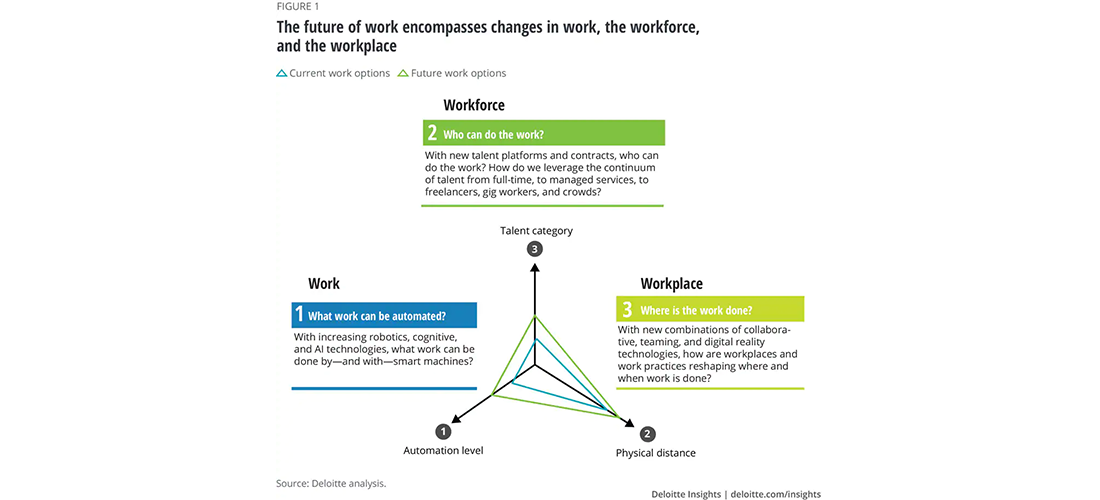
Leaders Embracing The Future Of Work
6 yearsago 0 Comments 2k Views
We live through a great transition in the way people work. A continuous and extraordinary innovation in machine learning and robots has and will continue to reshape the “work”. Some tasks will be replaced. Others will be strengthened. No one – whether skilled or unskilled – will not be affected. Business is where the first changes take place, and what business leaders need to do to prepare for the future?
Three aspects of the future of work
According to Deloitte, the future of work is the result of a change in influence on three main aspects of the business: work (what), the workforce (who) and workplace (where). The new realities created by these forces of change present us with complex questions such as what the work will be like in the next 20, 30, 100 years and how we can prepare for it. Specifically, the above aspects will have the following changes:
- Work – The nature of work: The development of technology, especially automation and artificial intelligence, makes people no longer have to do repetitive, routine things. This brings worry about being replaced by machines of unskilled workers. However, machinery in the present time and in the near future, still need people to be able to operate properly. So workers can be somewhat compassionate and instead of being worried, just prepare yourself for the changes.
- Workforce: Today’s staff is more diverse, stretching from part-time, full-time employees, contractor employees and even freelancers. Enterprises have more options in optimizing this resource to match business objectives. The use of diverse human resources will help the organization more active in organizing work in accordance with the objectives in each project, period of time,… The diversity of the current labor force also makes the talents that workers have a better opportunity to maximize their potential and bring better and more sustainable values for society.
- Workplace – Working environment: Almost all jobs require human cooperation with people to get results, which is why we have the workplace. But now with digital work tools, employees have many ways to communicate with each other and complete the work without having to meet each other anymore. This can change the way people interact with work anywhere and anytime
The future of work: leaders change before changes.
To succeed in this “new era”, leaders must understand how organizations are becoming flattered, more complex and more integrated. These changes require individuals and groups to operate in new ways, thus requiring new thinking and skills to be cultivated. Here are the key factors that leaders need to focus on:
1. Capture all aspects of diversity: leaders will have to interact more often with diverse groups of people, representing diverse cultures, geographies, and ways of working and thinking. As a leader, you have a responsibility to make sure everyone in your team respects these differences to find new insights. Collaboration and influence are two important skills to accomplish this and should be exemplified by leaders and managers at all levels of the organization.

2. Facilitate real-time learning: leaders and employees need to understand the importance of learning as a lifelong job. You and your employees need to actively seek or create opportunities for learning while working. To do this, you need to be comfortable and ready to both teach and learn from others. Especially leaders can learn a lot from young people who are born in the digital age and have regular interaction with technology. They will have new and more creative perspectives. At the same time, young people can learn from their leader’s management skills and work experience. Both sides need to understand the importance of lifelong learning to be able to grow together
3. Encourage meaningful failures: Traditionally, organizations try to minimize risks and failures. In the new working world, leaders need to take risks and embrace productivity failures to create experiences and lessons. So, instead of managing risk, move on to minimize costs and losses from risk-taking. Being more comfortable with meaningful failures will open up businesses with new directions in an era of rapid changes. Risk management is a good thing, but don’t let it hinder new potential steps of your business by always accepting mistakes and fixing it to get better results.
4. Facilitate how to work agile: In a world where technology continues to change, you may find that a process that was completed six months ago is no longer relevant. We need to adjust tactics quickly. Leaders who understand this will build teams that are able to capture changes, identify and communicate new goals, and find and collaborate with people with the resources needed to implement it.

The future of work isn’t coming; it’s already here. And what the leader – you, need to do now is to continue thinking and acting beyond the limits. Develop a vision and the ability to predict future changes. Only prepare yourself, can you lead your business to thrive in this digital era.
——————–
How do you think about this article? Please share it with us via the comment section below.
PRIMUS – FIRST CLASS JOBS ONLY






